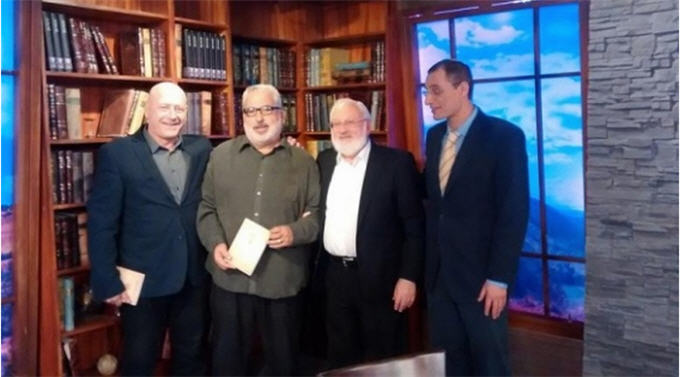Together with host, Chaim Ratz, we shot two special episodes of JTimes, a TV series broadcast on JLTV and Shalom TV. The discussion developed around the role of the Jewish people and the reasons for anti-Semitism.
It was very interesting to hear Mr. Elcott’s input regarding the generous donations of Jews toward non-Jewish causes such as hospitals and universities. According to him, only 11% of funds donated by Jews go to purely Jewish causes, and the rest are donated to the benefit of the general population.
Even more fascinating to me was his explanation of how the majority of Jewish millennials veer off from anything that emits a scent of religiousness. It is as though they are looking for a spiritual connection rather than a religious one per se.
All of us in the studio were well aware of the fact that many young Jews want nothing to do with Judaism. However, we were talking more about those who are still connected, but are searching for a way that will cater to their needs, which, as just mentioned, are more spiritual than religious.
I think it is a very good sign that this is happening because it gives us a chance to introduce a new paradigm into the concept of being Jewish. It is not that any of us rejects observance of commandments in the traditional, way. Far from it. But the fact that so many Jewish youngsters are looking elsewhere for the meaning of being Jewish gives us an opportunity to tap into the roots of our people and the principles by which our nation was initially founded.
We all felt that what is lacking today in Jewish communities, and everywhere else, for that matter, is a sense of solidarity. The apprehension we feel toward the concept of a mission that has been cast upon us, albeit natural, stops us from pausing to think together, and makes us turn away from our own heritage.
At the same time, as Mr. Elcott pointed out, the concept of Tikkun Olam (correction of the world) is vibrant among Jews and determines many of their actions. All we need to do then, is find out how to do it effectively, so that it actually yields the correction of the world, and at the same time the elimination of hatred, including the most ancient hatred of all, anti-Semitism.
In my view, the unique gift that we have to give to the world, and which in my perception is the only gift that the nations expect from us, is the ability to unite. I do realize how far we are from unity ourselves, but we are the only nation capable of uniting if we choose to. The rest of the nations, and the reality of our lives supports it, will only grow more fragmented and hateful of each other. And the more they hate each other, the more they will hate us, guaranteed, because unlike them, we once held the knowledge of unity above differences, but we have lost it.
So what we need to do is search within us for the key to unity, rekindle it—and yes, we can—and offer it.
Mr. Elcott made a distinction that I often hear about the difference between anti-Israelism, as he called it, and anti-Semitism. I’m well aware of the distinction, but I think that in the long run it will not hold. We have been hated for so many reasons before, including reasons that clearly contradict one another, and which were held by the same people at the same time. It’s clear to me that we are hated for something far deeper than the different accusations being thrown at us at different times and circumstances.
As one who has seen how methods of unity above differences work, such as Integral Education, used by the Arvut movement in Israel, or Tal Ronen’s Reboot method, I know that if we only give ourselves a chance, we can discover an amazing reality. We can realize that when other people’s views differ from our own, it creates a better whole from which we all benefit, rather than pose a threat to the legitimacy of our own views. In fact, many of today’s most successful companies rely on people’s differing opinions and perspectives to achieve the best results for their products, for their marketing strategies, and for their R&D teams.
Now we need to embrace the models of unity above differences and apply them to our own communities. There is no doubt we will discover that the same benefits we reap in the corporate world are just as feasible in our social environment.
And if we do that, we will truly become a role model that others will want to emulate, and we will all have a wonderful year of solidarity and friendship in 2015.
This article was originally published in the Jewish Journal


